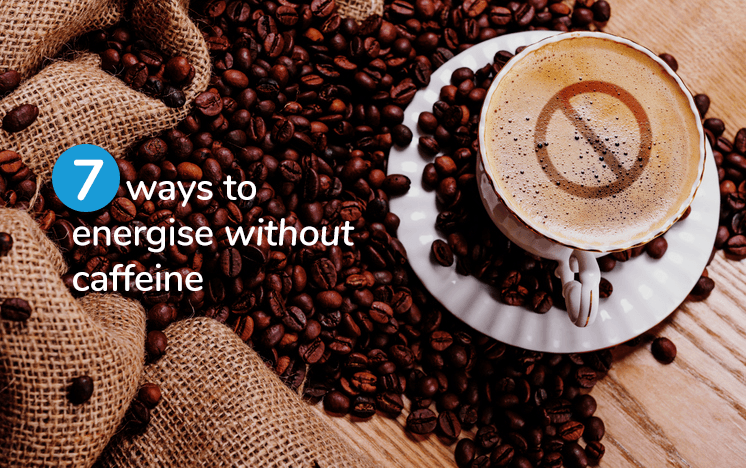Feeling tired all the time is no fun. You might feel like you can’t get through the day without a nap or that you just don’t have any energy to do the things you enjoy. If this sounds like you, don’t worry, you’re not alone. Feeling tired is a common problem, but there are plenty of things you can do to fight it. Often, lifestyle factors are the cause. In this blog post we’re going to take a look at the causes of tiredness, as well as some self-help tips to boost energy levels. Let’s get started.
What are the causes of fatigue?
There are lots of different things that can cause tiredness, they can be psychological causes, physical causes and lifestyle causes. Some of the most common causes include:
Dehydrated
Most people are aware that dehydration can cause thirst and dry mouth. However, many people do not realize that dehydration is one of the most common causes of tiredness. When the body is dehydrated, it cannot function properly. Every system in the body depends on water to function optimally and without enough water, the body cannot perform at its best. Dehydration can cause a decrease in blood volume, which leads to reduced blood flow and oxygen delivery to the cells. This can result in feelings of exhaustion and low energy levels. In addition, dehydration can cause electrolyte imbalances, muscle cramps and headaches, all of which can contribute to tiredness.
Stress
Tiredness is a common symptom of stress. When we are stressed, our bodies go into “fight or flight” mode, which is a survival mechanism that dates back to our prehistoric ancestors. In this state, the body releases stress hormones like adrenaline and cortisol. These hormones increase heart rate and blood pressure, they also divert blood away from the digestive system towards muscles.
As a result, we may experience symptoms like headaches, sweating and difficulty concentrating. Over time, this can lead to fatigue and exhaustion. Additionally, stress can interfere with sleep, both indirectly by making it difficult to fall asleep and directly by causing disruptive sleep patterns. The end result is that we are left feeling tired and run down.
Lack of sleep
Most people know from experience that not getting enough sleep can leave them feeling groggy and unfocused the next day. However, they may not be aware of the many ways in which lack of sleep can contribute to fatigue. For one thing, sleep deprivation can lead to an accumulation of adenosine, a neurotransmitter that promotes feelings of sleepiness. Sleep also helps to restore the body’s energy levels by replenishing glycogen stores and providing time for cell repair. Furthermore, sleep plays an important role in regulating hormones like cortisol and insulin, which can impact energy levels. Finally, sleep helps to support brain function, research has shown that even a brief period of sleep loss can impair cognitive performance. Taken together, these effects help to explain why lack of sleep can cause fatigue.
Anaemia
Anaemia is a condition in which there is a decreased number of red blood cells or hemoglobin in the blood. This can cause fatigue, pale skin and shortness of breath, among other symptoms. The most common cause of anaemia is iron deficiency, which can be caused by blood loss, inadequate iron intake or pregnancy. Anaemia can also be caused by certain chronic diseases, such as cancer or kidney disease. Treatment for anaemia typically involves taking supplements or receiving injections of iron. Fatigue is one of the most common symptoms of anaemia and can make it difficult to carry out daily life activities. If you are experiencing unexplained fatigue, it is important to see your doctor to rule out anaemia or other potential causes.
Sleep apnea
Sleep apnea is a condition that causes interrupted breathing during sleep. It can occur when the airway becomes blocked, preventing air from flowing into the lungs. Sleep apnea can cause daytime tiredness, as well as other symptoms such as loud snoring, gasping for breath during sleep and waking up with a headache or dry mouth. The condition is often caused by obesity, which can narrow the airway.
Sleep apnea can also be caused by smoking, alcohol use and certain medical conditions such as diabetes and heart disease. Treatments for sleep apnea include lifestyle changes, such as losing weight, quitting smoking and using a device that helps to keep the airway open during sleep. In some cases, surgery may also be necessary.
Thyroid problems
An underactive thyroid gland (hypothyroidism) can cause fatigue and make it difficult to concentrate. An overactive thyroid gland (hyperthyroidism) can also lead to fatigue and other symptoms like anxiety and palpitations.
Depression and anxiety
Feeling tired all the time can be a sign of a mental health issue such as depression or anxiety. These conditions can cause extreme tiredness as well as feelings of hopelessness and worthlessness and can cause physical symptoms like trembling, sweating and difficulty concentrating, all of which can lead to fatigue.
Tips to fight tiredness
There are lots of different things you can do to treat tiredness, fatigue, and low energy.
Increase physical activity
While it may seem counter-intuitive, physical activity is actually one of the best ways to combat fatigue. When we are tired our bodies produce a hormone called adenosine. Adenosine acts as a sedative, telling our brains that it is time to rest. However, when we exercise, our bodies produce adrenaline.
Adrenaline is a stimulating hormone that helps to increase alertness and energy levels. Regular exercise also helps to improve the quality of our sleep, making us less likely to feel tired during the day. In addition, exercise releases endorphins, which have mood-boosting effects. As a result, we not only feel more energetic after a workout, but we also tend to feel happier and less stressed. Incorporating a moderate amount of physical activity into our daily routine can help to improve fatigue.
Healthy eating
The first step is to cut back on sugary foods and drinks, as these can cause energy levels to crash shortly after consuming them. Instead, focus on eating complex carbohydrates such as whole grains, which provide sustained energy over a longer period of time.
It’s also important to make sure you’re eating enough protein, as this helps to build and repair muscle tissue. Good sources of protein include lean meats, chicken, fish, eggs and beans. Foods that are rich in protein and healthy fats, like salmon and avocados, help to stabilise blood sugar levels and prevent fatigue. Instead of eating three big meals per day, try eating six mini meals as large meals can drain your energy. Smaller meals throughout the day may help increase your energy levels.
Make sure you’re getting enough iron. Iron is responsible for carrying oxygen to cells and a lack of iron can lead to fatigue. Good sources of iron-rich foods include beef, pork, poultry, beans, lentils and spinach. Try to increase your intake of vitamins and minerals by eating plenty of fresh fruits and vegetables. These are essential for maintaining a healthy metabolism and keeping your energy levels up. By following these simple tips, you can ensure that fatigue is no longer a part of your daily life.
Increase water intake
Most people know that drinking water is important for overall health, but many don’t realise that it can also help to combat tiredness. When the body is even slightly dehydrated, it can lead to feelings of fatigue and lethargy. On the other hand, increasing water intake can help to improve energy levels and mental alertness. One way that water helps to fight fatigue is by helping to circulate oxygen throughout the body.
In addition, water helps the body to absorb essential nutrients and minerals. Finally, water aids in the removal of toxins from the body, which can also contribute to feelings of fatigue. By increasing water intake, we can help our bodies to function at their best and fight off tiredness.
Avoid caffeine drinks
Caffeine is a stimulant, which means that it can interfere with sleep and make it difficult to fall asleep at night. In addition, caffeine can lead to dependence and may cause withdrawal symptoms when you try to cut back. For these reasons, avoiding caffeine is often the best way to improve tiredness.
Instead of reaching for a cup of coffee, try drinking water or herbal tea. You may also want to get more sleep by going to bed earlier or taking a nap during the day. By making simple changes like these, you can help yourself feel more rested and alert.
Increase quality sleep
Getting a good night’s sleep can be challenging, but there are a few simple tips that can help. First, try to establish a regular sleep schedule by going to bed and waking up at the same time each day. Second, create a relaxing bedtime routine to help signal to your body that it is time to sleep. Finally, make sure that your bedroom is dark, quiet, and cool in order to promote relaxation. By following these tips, you can improve the quality of your sleep and feel more rested during the day.
Focus on yourself
Taking time to focus on yourself could improve your tiredness and overall health. Practice relaxation techniques. This could involve deep breathing exercises, yoga or even just taking a few moments each day to clear your mind. Additionally, spending time with friends and family can help to improve your energy levels.
Whether you’re enjoying a night out or simply catching up over coffee, social interaction can help to boost your mood and give you the motivation you need to power through your day. By incorporating these simple strategies into your daily routine, you can help to reduce stress and improve tiredness.
Seeking Help
If self-help measures and lifestyle changes haven’t worked after 4 weeks, or if your fatigue is having a significant impact on your quality of life, see a healthcare professional for medical advice. They may refer you for tests such as blood tests or thyroid function tests. They may make a referral to talking therapies such as counselling or cognitive behavioural therapy (CBT).
In some cases, fatigue may be caused by an underlying medical condition such as an infection, thyroid problem or depression. If this is the case, treatment for the underlying condition should help relieve your symptoms.
Sources
Medical Disclaimer
NowPatient has taken all reasonable steps to ensure that all material is factually accurate, complete, and current. However, the knowledge and experience of a qualified healthcare professional should always be sought after instead of using the information on this page. Before taking any drug, you should always speak to your doctor or another qualified healthcare provider.
The information provided here about medications is subject to change and is not meant to include all uses, precautions, warnings, directions, drug interactions, allergic reactions, or negative effects. The absence of warnings or other information for a particular medication does not imply that the medication or medication combination is appropriate for all patients or for all possible purposes.







